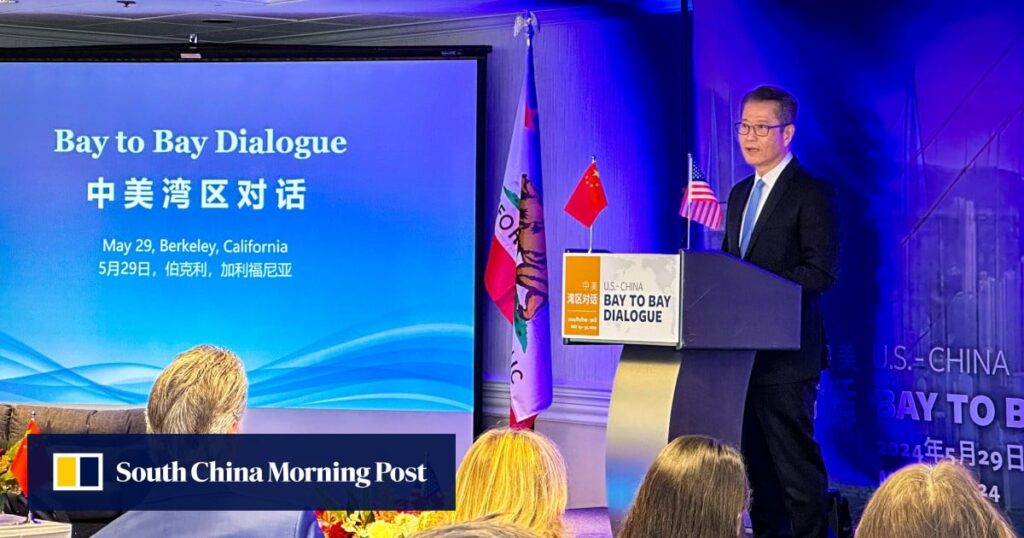The plan aims to transform Hong Kong, Macau and nine cities in Guangdong province into high-tech economic powerhouses by 2035.
On the U.S. side, California Gov. Gavin Newsom, the first U.S. governor to visit mainland China and Hong Kong since the COVID-19 pandemic, and environmental officials attended.
“Given the many pressing issues facing us today, from climate change to geopolitical crises, it is more important than ever that we maintain open and candid communication,” Chang told the Bay to Bay Dialogue forum audience, following a brief welcoming remarks from Governor Newsom.
“There is much for both our countries to work on together, especially in the Gulf region, and Hong Kong is pleased to play an important role in this regard.”
Chan said the agreement reached by the two sides “lays a solid foundation for cooperation” and that Hong Kong can continue to serve as a base for mainland Chinese companies to expand their operations overseas while also serving as a centre for green technology and finance.
He announced that the dialogue's host, the California-China Climate Institute, had signed two memorandums of understanding with Hong Kong, including one with the Financial Services and Treasury Bureau to strengthen cooperation in sustainable finance, green fintech, carbon market development, climate risk analysis, and sustainability disclosure.
Another was to work with the University of Hong Kong's Climate and Carbon Neutral Institute to forge closer ties with think tanks and higher education institutions.
Guangdong Governor Wang Weizhong cited several areas he believes Guangdong and California could work on to strengthen cooperation, including education, technology, culture and tourism.
“California has good practices and experience in tackling climate change and promoting decarbonization. We hope to strengthen exchanges on the application of pioneering technologies and develop joint projects,” he said.
The provincial government's Bureau of Ecology and Environment has signed an agreement with the California-China Climate Research Institute, while the Guangdong Provincial Department of Commerce has signed a memorandum of understanding with the San Francisco office of the U.S. Department of Commerce.
Other agreements announced Wednesday include youth exchange programs and cooperation between the China People's Association for Friendship with Foreign Countries and the Pacific Citizens Exchange Association.
The California-China Climate Institute was born out of a meeting between former California Governor Jerry Brown and Chinese President Xi Jinping in 2017 and was launched in 2019. The institute also serves as the secretariat for several China-California climate memoranda of understanding.
The total economic output of the Guangdong-Hong Kong-Macao Greater Bay Area reached 14 trillion yuan last year, with Guangdong province boasting the largest GDP of all provinces, accounting for 10.7 percent of the country's GDP.
The nine-county San Francisco Bay Area is home to many of the world's largest technology companies, including Silicon Valley's Apple, Google, and Facebook.
Dee Dee Myers, a senior adviser to the California governor, told Chinese leaders at the event that a U.S. delegation led by Newsom had been warmly welcomed in China last October. She said the two superpowers, which account for 42% of global emissions, agreed that developing people-to-people ties on climate issues was a key goal going forward.
“It is not in anyone's interest for our economies to decouple. We need to continue to cooperate economically and diplomatically to achieve our common goals,” she said.
During his visit, Newsom met with President Xi Jinping to discuss clean energy and climate change, and also made a brief stop in Hong Kong, drawing criticism from some US lawmakers, who said a sole focus on climate change “creates a problematic atmosphere for future diplomatic relations” and favors Hong Kong's sanctioned leaders.
Wednesday's dialogue was held in conjunction with a high-level U.S.-China meeting on local-level climate change efforts.
Last November, Washington and Beijing agreed to a new commitment to help local governments, businesses and think tanks discuss policies and cooperation programs on climate change issues.
The two-day event was part of a follow-up initiative to discuss areas such as energy transition, greenhouse gases, circular economy and resource efficiency, deforestation, and low-carbon and sustainable cities.


